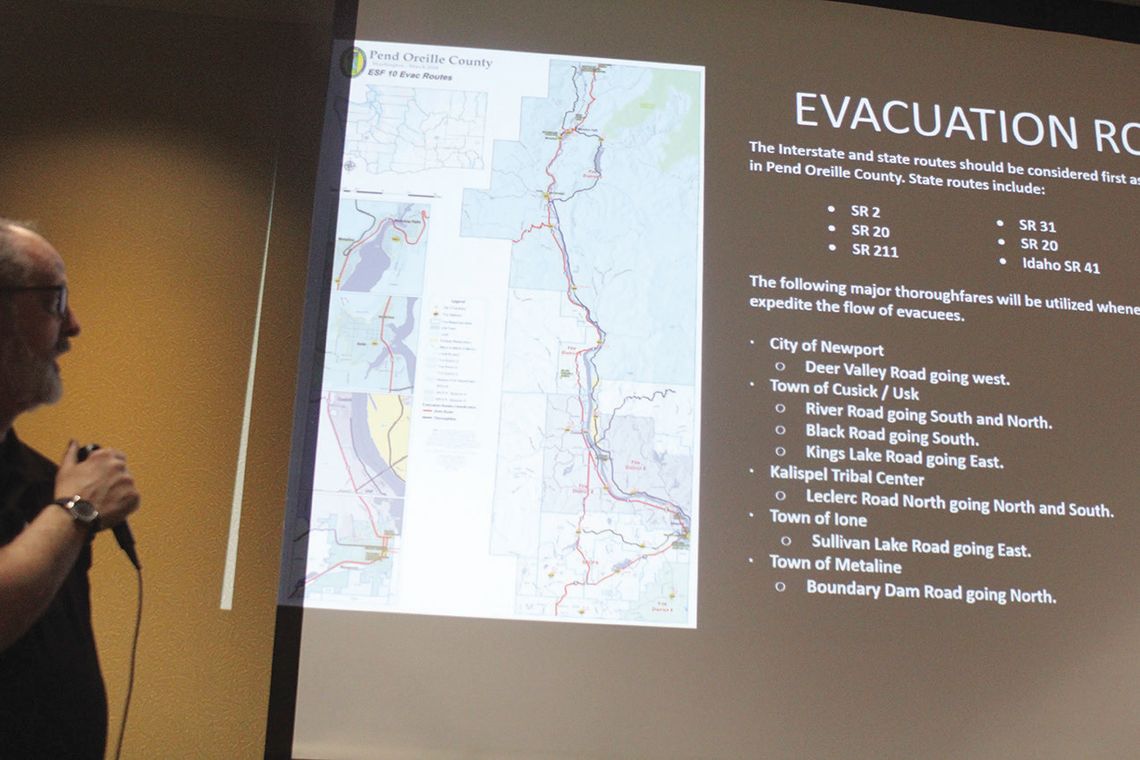USK — When you live in fire country, being prepared is important. That was one of the messages given at the Catastrophic Wildfire Prevention Program Saturday, March 1, at the Camas Center for Community Wellness.
Living in a forest is dangerous, said Tom Pulford, a retired landscape architect and one of the presenters. There are practical things people need to think about to prepare for catastrophic fire.
“You need to have a wayfinding sign,” he said, “one of those blue signs with your address on it. You need to have that. You need to have it up high and out of the snow all year round.”
There are other things Pulford talked about.
“The key is ember control,” he said, in the event of a wildfire like the Oregon Road fire. “You’re going to have the ability to deal with embers and they get tossed 3 to 5 miles.”
People should know what they are going to do if the power goes out.
“You need to think about what’s that’s doing,” he said. “Is that garage door open? Can I lift it? If you live in a gated community, is that gate open. When the grid’s down, it’s down and it needs to go down.”
Pullford’s talk, like most the other half dozen presentations, had valuable advice. More than 100 people, including presentors, attended the day-long event put on by Responsible Growth * Northeast Washington. The Pend Oreille County Sheriff’s Office, South Pend Oreille Fire and Rescue, the U.S. Forest Service, the Pend Oreille Public Utility District, the state Department of Natural Resources and the Pend Oreille Conservation District all made presentations and had written information to distribute.
Pend Oreille County Undersheriff Geoff Rusho spoke about the Ready, Set, Go program, in which people prepare to evacuate in the event of a fire.
He emphasized the need to make a plan and to have Nixle alerts. Nixle is the communication platform that allows public safety agencies to send alerts to registered recipients by text. You can sign up by texting 888777 with your area code.
If there is an emergency like a wildfire, people should be prepared.
“People should be ready to be away for three days,” Rusho said. They should have medications, things for pets, the pets themselves.
They should have a Go bag ready to grab with things like important papers, phone numbers and clothing, Rusho said.
In the Set phase, people should be prepared to leave at a moment’s notice. It means that dangerous conditions threaten your current location, he said. The Sheriff’s Office tries to be specific about where the danger is, so if the Set warning goes out, people should be ready to leave. People that need extra time, such as disabled people, should leave then, he said.
The Go phase means what is says. People need to leave now.
He acknowledges that Pend Oreille County has a defiant population that may not want to leave, but that if they don’t leave when the Go order is given, resources may not be able to save them.
If people do leave and want to get back to the property to retrieve something they forgot, they likely won’t get back. He said there are laws that allow deputies to keep people from going back.
Reese Bennett of the U.S. Forest Service said that the Forest Service set values, or areas that they can protect in the event of a big fire like watersheds and towns.
“We can’t protect grizzly bear habitat, it’s too big,” he said. “We can protect the Town of Cusick.”
He said property owners can help out by doing fuels reduction, keeping brush cut and removing other flammable material.
“Fuels reduction works best in collaboration,” he said. Doing one 10-acre portion isn’t as effective as combining with neighbors to do a larger area.
Newport-Sullivan Lake Ranger District Ranger Carin Vidala fielded a question about what effect the federal cuts were having and would have in the future.
“We just don’t know,” she said.
.png)







